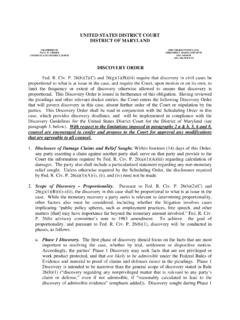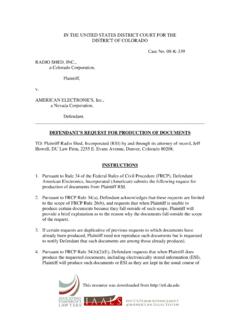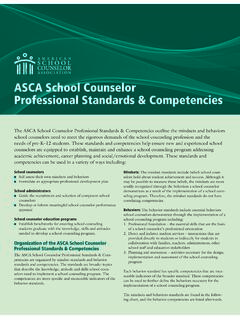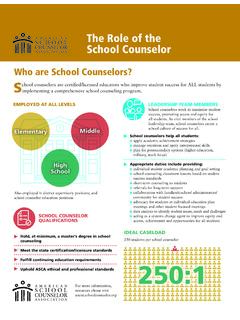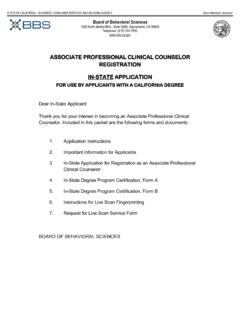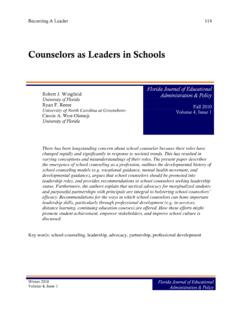Transcription of Sample Professional Identity Assignments
1 Sample Professional Identity Assignments Developing Your Professional Identity A. Introduction Students, One of the most important learning objectives in law school is to develop your Professional Identity . Your Professional Identity includes how to bring your personal values into your profession so that you don't lose your sense of self. Thus, it is important to create your Professional Identity early, often, and actively rather than letting experiences and reactions to experiences define you. In addition to brining your own belief system into your Professional Identity , part of the law school learning objectives is to learn and embrace the values of the profession.
2 In fact, adhering to the values of the profession are so important, Professional Responsibility is one of only two courses specifically required by our accrediting body. (The other course is legal writing because, yes, it is that important.). You will have at least one course on Professional Responsibility in law school . Before you can sit for the bar exam, most states require you to take a test called the Multistate Professional Responsibility Examination. In addition, even if you pass the Multistate Professional Responsibility Examination, graduate from law school , and pass the bar examination, states still require you to pass a character and fitness process to ensure that you have demonstrated moral fitness in both your Professional and personal life.
3 Thus, it is important to both bring your own values into the profession and embrace the values of the profession. These values include abiding by the law, candor (truthfulness), being prepared, zealous advocacy, and promoting equal access to justice. The exercises in this chapter will help you explicitly identify your own values as well as begin to have you think about the values of the profession. This semester, you must complete * Assignments as part of your Property course. B. Professional Identity Letter to Self Professional Identity Letters Learning Objectives To identify the core values you have as you enter the legal profession.
4 To solidify the commitments you want to make to yourself as to how to the type of person and type of lawyer you want to be. To begin to establish a Professional Identity . To begin to foster the types of relationships you want to have with the legal community. To reinforce the importance of following directions. Assignment Description Read the two articles on Professional Identity that are posted on D2L. Write a letter to yourself. Your letter should be no more than 350 words. It should fit on one page. The letter should describe what core values are most important to you. You may explain why those core values are important to you, if that will motivate you in the future.
5 The letter should explain how you want to incorporate those core values into your Professional Identity as a lawyer. You can do this by identifying the change you want to cause through your practice of law, the way you want to treat your clients, the way you want to interact with other members of your profession, or anything else that will help you identify how you will honor your core values within your practice of law. They letter may also identify why you wanted to become a lawyer or what motivated you, if that is relevant to how you will incorporate your core values. The letter should also identify what type of reputation you want to create in the legal community.
6 How do you want your clients to know you? How do you want your colleagues to know you? How do you want opposing counsel to know you? How do you want general members of the legal profession to know you? Submission Guidelines You will turn in four copies of this letter before class on the day the letters are due. You may turn in your letters early. The first copy will be typed and signed. On this copy, you must attach a photograph of yourself to the letter. The second, third, and fourth copies should all be placed in separate envelopes. Each envelope should contain your permanent mailing address (many people use a relative's address) and a stamp.
7 Put a rubber band around your three envelopes. The open letter and three sealed copies must be turned in by the beginning of class on the due date. Grading You will receive full credit for turning in a good faith effort of this assignment on or before the due date. If you fail to follow these instructions precisely, I reserve the right to deduct partial or full points. C. Engaging in Pro Bono Service If there is any fundamental proposition of government on which all would agree, it is that one of the highest goals of society must be to achieve and maintain equality before the law. Yet this ideal remains an empty form of words unless the legal profession is ready to provide adequate representation for those unable to pay the usual fees.
8 Professional Representation: Report of the Joint Conference, 44 1159, 1216 (1958). Objectives: Apply the legal discourse, organization, and analysis skills in a practioner environment to identify the practical applications of our academic skills lessons. Serve the underserved through pro bono opportunities. Embrace the values of the profession that provide justice for all despite economic means. Learn practitioner-ready skills in a legal context of your choosing. Meet practicing attorneys and begin to build your legal network. One of the values of the profession is to give back to the community. While lawyers need to charge for their services and earn a living, lawyers also realize that justice is limited to those who can afford lawyers.
9 Thus, one of the deepest values in the profession is to engage in pro bono activities. It is so deeply engrained in our profession that you cannot graduate, or sit for the bar in many states, unless you've engaged in a certain number of pro bono hours. The dilemma is, when are you supposed to find the time for pro bono when classes pull you away from it? Unfortunately, too many students find themselves in their sixth semester, scrambling to engage in pro bono activities in order to graduate on time. That's not a good plan. One solution is to make it an optional part of the class, just like many law firms make pro bono service a required part of your billable hours.
10 Thus, for every two hours of pro bono training or pro bono work that you engage in, you can earn one Professional Identity exercise. If you engage in 2-3 hours, you can earn 1 practitioner exercise. If you engage in 4-5, you can earn two. Many pro bono activities require training, especially for non-licensed students. To ensure the greatest possible flexibility, I am allowing you to earn credit for your pro bono training in addition to your actual pro bono work. At Charlotte Law, Sean Lew ) helps students coordinate pro bono activities. You can reach out to Professor Lew for more information about pro bono opportunities at Charlotte Law.
